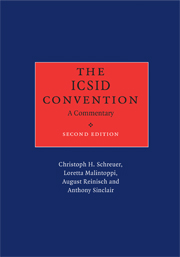Book contents
- Frontmatter
- Contents
- Foreword by Professor Sir Elihu Lauterpacht, CBE, QC
- Authors' preface to the second edition
- Table of cases
- List of abbreviations
- Text of the ICSID Convention
- Procedural calendar
- PREAMBLE
- CHAPTER I International Centre for Settlement of Investment Disputes
- CHAPTER II Jurisdiction of the Centre
- CHAPTER III Conciliation
- CHAPTER IV Arbitration
- Article 36 Request for Arbitration
- Article 37 Composition of Tribunal
- Article 38 Appointment by Chairman
- Article 39 Nationality of Arbitrators
- Article 40 Qualities of Arbitrators
- Article 41 Decision on Jurisdiction
- Article 42 Applicable Law
- Article 43 Evidence
- Article 44 Rules on Procedure
- Article 45 Default of a Party
- Article 46 Ancillary Claims
- Article 47 Provisional Measures
- Article 48 Award
- Article 49 Dispatch, Supplementation and Rectification
- Article 50 Interpretation
- Article 51 Revision
- Article 52 Annulment
- Article 53 Binding Force
- Article 54 Enforcement
- Article 55 State Immunity
- CHAPTER V Replacement and Disqualification of Conciliators and Arbitrators
- CHAPTER VI Cost of Proceedings
- CHAPTER VII Place of Proceedings
- CHAPTER VIII Disputes between Contracting States
- CHAPTER IX Amendment
- CHAPTER X Final Provisions
- Final Clause
- Consolidated bibliography
- Index by article
- Index by subject
Article 45 - Default of a Party
from CHAPTER IV - Arbitration
Published online by Cambridge University Press: 07 September 2010
- Frontmatter
- Contents
- Foreword by Professor Sir Elihu Lauterpacht, CBE, QC
- Authors' preface to the second edition
- Table of cases
- List of abbreviations
- Text of the ICSID Convention
- Procedural calendar
- PREAMBLE
- CHAPTER I International Centre for Settlement of Investment Disputes
- CHAPTER II Jurisdiction of the Centre
- CHAPTER III Conciliation
- CHAPTER IV Arbitration
- Article 36 Request for Arbitration
- Article 37 Composition of Tribunal
- Article 38 Appointment by Chairman
- Article 39 Nationality of Arbitrators
- Article 40 Qualities of Arbitrators
- Article 41 Decision on Jurisdiction
- Article 42 Applicable Law
- Article 43 Evidence
- Article 44 Rules on Procedure
- Article 45 Default of a Party
- Article 46 Ancillary Claims
- Article 47 Provisional Measures
- Article 48 Award
- Article 49 Dispatch, Supplementation and Rectification
- Article 50 Interpretation
- Article 51 Revision
- Article 52 Annulment
- Article 53 Binding Force
- Article 54 Enforcement
- Article 55 State Immunity
- CHAPTER V Replacement and Disqualification of Conciliators and Arbitrators
- CHAPTER VI Cost of Proceedings
- CHAPTER VII Place of Proceedings
- CHAPTER VIII Disputes between Contracting States
- CHAPTER IX Amendment
- CHAPTER X Final Provisions
- Final Clause
- Consolidated bibliography
- Index by article
- Index by subject
Summary
INTRODUCTION
Most modern instruments governing international adjudication contain provisions dealing with the phenomenon of non-cooperating parties. Comparable clauses may be found in the Statute of the International Court of Justice (Art. 53), in the 1958 International Law Commission's Model Rules on Arbitral Procedure (Art. 25), in the 1998 International Chamber of Commerce Rules of Arbitration (Art. 21(2)), in the 1976 UNCITRAL Arbitration Rules (Art. 28), in the 1985 UNICITRAL Model Law on International Commercial Arbitration (Art. 25) and in the Institute of International Law's 1989 Articles on Arbitration between States, State Enterprises or State Entities and Foreign Enterprises (Art. 3(c)).
Art. 45 covers three points. The first is the principle of non-frustration. In other words, arbitral proceedings will not be thwarted by one side's lack of cooperation. The first sentence of Art. 45(2) expresses this principle. The second point is a rule of evidence. The appearing party's assertions will not be accepted just because the other party does not cooperate and hence does not contest them. This principle is expressed in Art. 45(1). The third point is a procedural rule designed to protect the interests of the non-cooperating party. It is expressed in the second sentence of Art. 45(2).
- Type
- Chapter
- Information
- The ICSID ConventionA Commentary, pp. 708 - 730Publisher: Cambridge University PressPrint publication year: 2009



